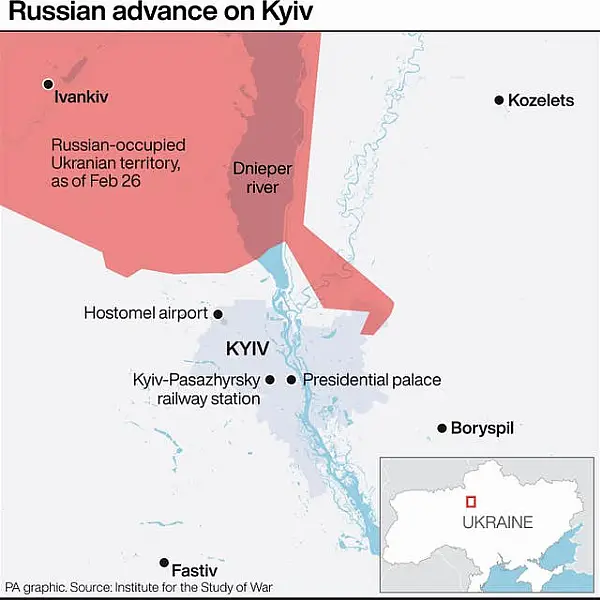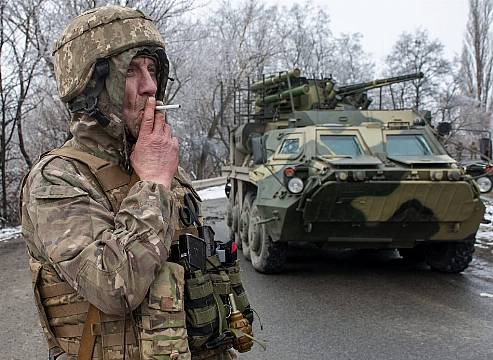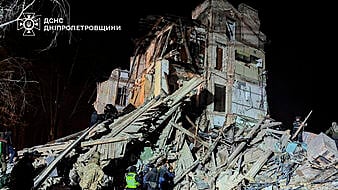In a dramatic escalation of East-West tensions over Russia’s invasion of Ukraine, President Vladimir Putin has ordered Russian nuclear forces to be put on high alert in response to what he called “aggressive statements” by leading Nato powers.
The order to put Russia’s nuclear weapons in an increased state of readiness for launch raised fears that the crisis could boil over into nuclear warfare, whether by design or miscalculation.
Amid the mounting tensions, Ukraine announced that a delegation would meet with Russian officials for talks.
But the Kremlin’s ultimate intentions towards Ukraine – and what steps might be enough to satisfy Moscow – remained unclear.

Hours after Mr Putin’s announcement, the top official in the European Union said the 27-nation bloc will close its airspace to Russian airlines and fund the purchase of weapons for Ukraine.
“For the first time ever, the European Union will finance the purchase and delivery of weapons and other equipment to a country that is under attack,” said European Commission president Ursula von der Leyen.
The EU will also ban some pro-Kremlin media outlets, she said.
The fast-moving developments came as Russian troops drew closer to Kyiv, a city of almost three million, street fighting broke out in Ukraine’s second-largest city, Kharkiv, and strategic ports in the country’s south came under pressure from the invading forces.
Ukrainian defenders put up stiff resistance that appeared to slow the invasion.
Mr Putin, in giving the nuclear alert directive, cited not only statements by Nato members but the hard-hitting financial sanctions imposed by the West against Russia, including the Russian leader himself.
Speaking at a meeting with his top officials, Mr Putin told his defence minister and the chief of the military’s General Staff to put nuclear forces in a “special regime of combat duty”.
“Western countries aren’t only taking unfriendly actions against our country in the economic sphere, but top officials from leading Nato members made aggressive statements regarding our country,” the Russian president said in televised comments.

US defence officials would not disclose their current nuclear posture, except to say that the military is prepared at all times to defend its homeland and allies.
White House press secretary Jen Psaki said Mr Putin is resorting to a pattern he used in the weeks before launching the invasion, “which is to manufacture threats that don’t exist in order to justify further aggression”.
She told ABC’s This Week that Russia has not been under threat from Nato or Ukraine.
“And we’re going to stand up,” Ms Psaki said, adding: “We have the ability to defend ourselves, but we also need to call out what we’re seeing here.”
Nato secretary-general Jens Stoltenberg told CNN, in reaction to Mr Putin’s decision to put Russia’s nuclear forces on high alert: “This is dangerous rhetoric. This is a behaviour which is irresponsible.”
The practical meaning of Mr Putin’s order was not immediately clear.
Russia and the United States typically have land-based and submarine-based nuclear forces on alert and prepared for combat at all times, but nuclear-capable bombers and other aircraft are not.
If Mr Putin is arming or otherwise raising the nuclear combat readiness of his bombers, or if he is ordering more ballistic missile submarines to sea, then the United States might feel compelled to respond in kind, said Hans Kristensen, a nuclear analyst at the Federation of American Scientists.

That would mark a worrying escalation, he said.
Max Bergmann, a former US State Department official, called Mr Putin’s talk predictable but dangerous sabre rattling.
“Things could spiral out of control,” said Mr Bergmann, now a senior fellow at the Centre for American Progress.
Around the same time as Mr Putin’s nuclear move, Ukrainian President Volodymyr Zelensky’s office said on the Telegram messaging app that the two sides would meet at an unspecified location on the Belarusian border.
The message did not give a precise time for the meeting.
The announcement came hours after Russia announced that its delegation had flown to Belarus to await talks.
Ukrainian officials initially rejected the move, saying any talks should take place elsewhere than Belarus, since it has allowed its territory to be used by Russian troops as a staging ground for the invasion.

Earlier on Sunday, the capital Kyiv was eerily quiet after huge explosions lit up the morning sky and authorities reported blasts at one of the airports.
Only an occasional car appeared on a deserted main boulevard as a strict 39-hour curfew kept people off the streets.
Terrified residents instead hunkered down in homes, underground garages and subway stations in anticipation of a full-scale Russian assault.
“The past night was tough – more shelling, more bombing of residential areas and civilian infrastructure,” Mr Zelensky said.
“There is not a single facility in the country that the occupiers wouldn’t consider as admissible targets.”

Until Sunday, Russia’s troops had remained on the outskirts of Kharkiv, a city of 1.4 million about 20 kilometres (12.4 miles) south of the border with Russia, while other forces rolled past to press the offensive deeper into Ukraine.
Videos posted on Ukrainian media and social networks showed Russian vehicles moving across Kharkiv and Russian troops roaming the city in small groups.
One showed Ukrainian troops firing at the Russians and damaged Russian light utility vehicles abandoned nearby.
The images underscored the determined resistance Russian troops face while attempting to enter Ukraine’s bigger cities.
Ukrainians have volunteered en masse to help defend the capital Kyiv and other cities, taking guns distributed by authorities and preparing firebombs to fight Russian forces.
Ukraine is also releasing prisoners with military experience who want to fight for the country, authorities said.

Mr Putin has not disclosed his ultimate plans, but Western officials believe he is determined to overthrow Ukraine’s government and replace it with a regime of his own, redrawing the map of Europe and reviving Moscow’s Cold War-era influence.
The pressure on strategic ports in the south of Ukraine appeared aimed at seizing control of the country’s coastline stretching from the border with Romania in the west to the border with Russia in the east.
A Russian Defence Ministry spokesman, Major General Igor Konashenkov, said Russian forces had blocked the cities of Kherson on the Black Sea and the port of Berdyansk on the Azov Sea.
He said the Russian forces also took control of an airbase near Kherson and the Azov Sea city of Henichesk.
Ukrainian authorities have also reported fighting near Odesa, Mykolaiv and other areas.
Cutting Ukraine’s access to its sea ports would deal a major blow to the country’s economy.
It could also allow Moscow to build a land corridor to Crimea, which Moscow annexed in 2014 and until now was connected to Russia by a 19-kilometre (12-mile) bridge, the longest bridge in Europe which opened in 2018.
Flames billowed from an oil depot near an airbase in Vasylkiv, a city 37 kilometres (23 miles) south of Kyiv where there has been intense fighting, according to the mayor.

Russian forces blew up a gas pipeline in Kharkiv, prompting the government to warn people to cover their windows with damp cloth or gauze as protection from smoke, the president’s office said.
Ukrainian military deputy commander Lt Gen Yevhen Moisiuk sounded a defiant note in a message aimed at Russian troops.
“Unload your weapons, raise your hands so that our servicemen and civilians can understand that you have heard us. This is your ticket home,” Lt Gen Moisiuk said in a Facebook video.
The number of casualties so far from Europe’s largest land conflict since the Second World War remains unclear amid the fog of combat.
Ukraine’s health minister reported on Saturday that 198 people, including three children, had been killed and more than 1,000 others wounded.
It was unclear whether those figures included both military and civilian casualties. Russia has not released any casualty information.
Russian Defence Ministry spokesman Major General Igor Konashenkov gave no figures on Russia’s dead and wounded on Sunday but said his country’s losses were “many times” lower than Ukraine’s.
The UN refugee agency said on Sunday that about 368,000 Ukrainians have arrived in neighbouring countries since the invasion started on Thursday.

Ukraine’s UN ambassador, Sergiy Kyslytsya, tweeted on Saturday that Ukraine appealed to the International Committee of the Red Cross (ICRC) “to facilitate repatriation of thousands of bodies of Russian soldiers”.
An accompanying chart claimed 3,500 Russian troops have been killed.
Laetitia Courtois, the ICRC’s permanent observer to the UN, told the Associated Press that the situation in Ukraine was “a limitation for our teams on the ground” and “we therefore cannot confirm numbers or other details”.
The United Nations’ refugee agency said on Sunday that about 368,000 Ukrainians have arrived in neighbouring countries since the invasion started Thursday.
The UN has estimated the conflict could produce as many as 4 million refugees, depending how long it continues.
Mr Zelensky denounced Russia’s offensive as “state terrorism”.
He said the attacks on Ukrainian cities should be investigated by an international war crimes tribunal and cost Russia its place as one of the five permanent members of the United Nations Security Council.
“Russia has taken the path of evil, and the world should come to depriving it of its UN Security Council seat,” he said.

As Russia pushes ahead with its offensive, the West is working to equip the outnumbered Ukrainian forces with weapons and ammunition while punishing Russia with far-reaching sanctions intended to further isolate Moscow.
The US pledged an additional 350 million dollars (£261 million) in military assistance to Ukraine, including anti-tank weapons, body armour and small arms.
Germany said it would send missiles and anti-tank weapons to the besieged country and that it would close its airspace to Russian planes.
The US, European Union and United Kingdom agreed to block “selected” Russian banks from the Swift global financial messaging system, which moves money around more than 11,000 banks and other financial institutions worldwide, part of a new round of sanctions aiming to impose a severe cost on Moscow for the invasion.
They also agreed to impose “restrictive measures” on Russia’s central bank.
Responding to a request from Ukraine’s minister of digital transformation, tech billionaire Elon Musk said on Twitter that his satellite-based internet system Starlink was now active in Ukraine and that there were “more terminals en route”.
German Chancellor Olaf Scholz, meanwhile, said on Sunday that his country is committing 100 billion euros (£84 billion) to a special fund for its armed forces, raising its defence spending above 2% of gross domestic product.

Mr Scholz told a special session of the Bundestag the investment was needed “to protect our freedom and our democracy.”
Mr Putin sent troops into Ukraine after denying for weeks that he intended to do so, all the while building up a force of almost 200,000 troops along the countries’ borders.
He claims the West has failed to take seriously Russia’s security concerns about Nato, the Western military alliance that Ukraine aspires to join.
But he has also expressed scorn about Ukraine’s right to exist as an independent state.
Russia claims its assault on Ukraine is aimed only at military targets, but bridges, schools and residential neighbourhoods have been hit.
Ukraine’s ambassador to the US, Oksana Markarova, said Ukraine was gathering evidence of shelling of residential areas, nurseries and hospitals to submit to an international war crimes court in The Hague as possible crimes against humanity.
The International Criminal Court’s prosecutor has said he is monitoring the conflict closely.
British Foreign Secretary Liz Truss warned that Mr Putin could use “the most unsavoury means”, including banned chemical or biological weapons, to defeat Ukraine.
“I urge the Russians not to escalate this conflict, but we do need to be prepared for Russia to seek to use even worse weapons,” Ms Truss told Sky News.







